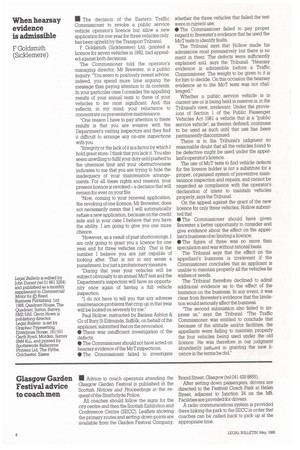When hearsay evidence is admissible
Page 10

If you've noticed an error in this article please click here to report it so we can fix it.
F Goldsmith (Sicklemere)
II The decision of the Eastern Traffic Commissioner to revoke a public service vehicle operator's licence but allow a new application for one year for three vehicles only, has been upheld by the Transport Tribunal, F Goldsmith (Sicklemere) Ltd, granted a licence for seven vehicles in 1982, had appealed against both decisions.
The Commissioner told the operator's managing director, Mr Brewster, at a public inquiry: You seem to positively resent advice; indeed, you spend more time arguing the message than paying attention to its contents. In your particular case I consider the appalling results of your annual tests to three of your vehicles to be most significant. And this reflects, in my mind, your reluctance to concentrate on preventative maintenance.
"One reason I have to pay attention to these results is that you are evasive with the Department's visiting inspectors and they find it difficult to arrange any on-site inspections with you.
"Integrity or the lack of it is a factor by which I hold great store: I think that you tack it. You also seem unwilling to fulfil your duty until pushed to the uttermost limit and your obstructiveness indicates to me that you are trying to hide the inadequacy of your maintenance arrangements. For all these rights and reasons, your present licence is revoked— a decision that will remain for ever on your file.
"Now, coming to your renewal application, the revoking of one licence, Mr Brewster, does not necessarily mean that I will automatically refuse a new application, because on the credit . side and in your case I believe that you have the ability. I am going to give you one more chance.
"However, as a result of past shortcomings, I am only going to grant you a licence for one year and for three vehicles only. That is the number I believe you are just capable of looking after. That is not in any sense a punishment, but just a probationary measure.
"During that year your vehicles will be subject obviously to an annual MoT test and the Department's inspectors will have an opportunity once again of having a full vehicle inspection "I do not have to tell you that any adverse maintenance problems that crop up in that year will be looked on severely by me."
Paul Hollow, instructed by Bankes Ashton & Co of Bury St Edmunds, Suffolk, on behalf of the applicant, submitted that on the revocation • There was insufficient investigation of the defects; • The Commissioner should not have acted on hearsay evidence of the MoT inspections, • The Commissioner failed to investigate whether the three vehicles that failed the test were in current use; • The Commissioner failed to pay proper regard to Brewster's evidence that he used the MoT tests to identify faults, The Tribunal says that Hollow made his admissions most persuasively but there is no merit in them. The defects were sufficiently explained and, says the Tribunal: "Hearsay evidence is admissible before a Traffic Commissioner. The weight to be given to it is for him to decide. On this occasion the hearsay evidence as to the MoT tests was not challenged."
Whether a public service vehicle is in current use or is being held in reserve is, in the Tribunal's view, irrelevant. Under the provisions of Section 1 of the Public Passenger Vehicles Act 1981 a vehicle that is a "public service vehicle", as therein defined, continues to be used as such until that use has been permanently discontinued.
There is in the Tribunal's judgment no reasonable doubt that all the vehicles found to be defective might be used under the appellant's operator's licence.
The use of MoT tests to find vehicle defects for the licence holder is not a substitute for a proper, organised system of preventive maintenance inspection and repairs, and cannot be regarded as compliance with the operator's declaration of intent to maintain vehicles properly, says the Tribunal.
On the appeal against the grant of the new licence for only three vehicles, Hollow submitted that • The Commissioner should have given Brewster a better opportunity to consider and give evidence about the effect on the appellant's business of so limiting a licence; • The figure of three was no more than speculation and was without rational basis.
The Tribunal says that the effect on the appellant's business is irrelevant if the Commissioner concludes that an applicant is unable to maintain properly all the vehicles he wishes or needs.
The Tribunal therefore declined to admit additional evidence as to the effect of the limitation on the business. In any event, it was clear from Brewster's evidence that the limitation would seriously affect the business.
"The second submission also failed to impress us," says the Tribunal. "The Traffic Commissioner was entitled to conclude that because of the attitude and/or facilities, the appellants were failing to maintain properly the four vehicles being used under the old licence. He was therefore in our judgment abundantly justuled in granting the new licence in the terms he did."
















































































































